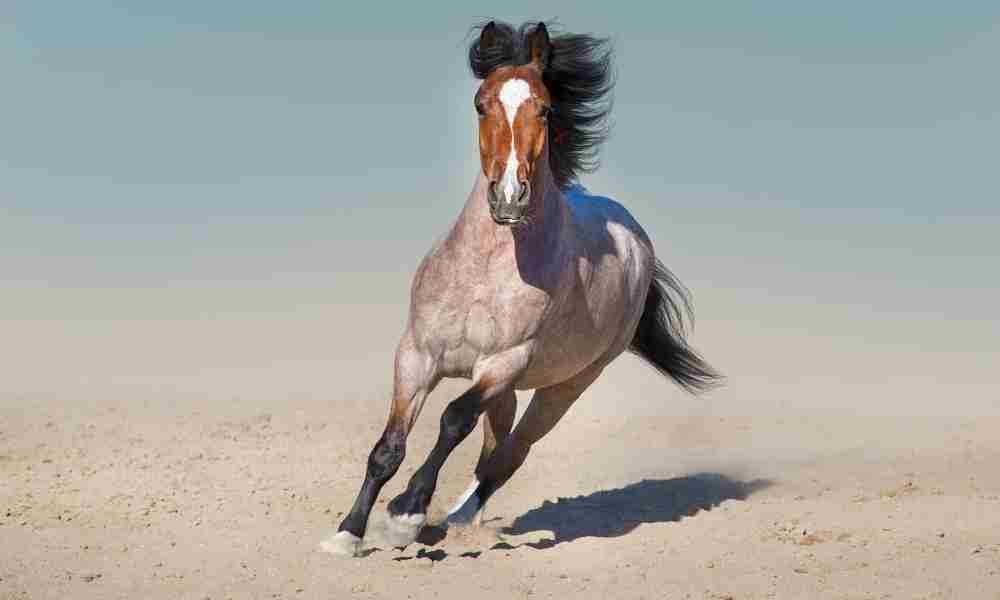From the wilderness to the plains, the world of black bears intersects in interesting ways. In this case, many questions arise relating to these two mammals.
In this article, I will discuss the main questions about black bears and horses. Keep reading below to find out that answer and more!
Table of Contents
- Will a Black Bear Attack a Horse?
- Could a Black Bear Eat a Horse?
- Can a Horse Kill a Black Bear?
- Can a Black Bear Outrun a Horse?
- Bear Encounter With Your Horse – What to Do
- Are Black Bears Afraid of Horses?
- Do Black Bears Smell Like Horses?
- Recap:
- Sources
Will a Black Bear Attack a Horse?
Yes, a black bear can attack a horse, mostly when they cross the same path. To clarify, black bears usually feel some kind of threat when they come close to larger animals.
In this case, black bears would try to defend themselves by attacking the horse. However, such cases are fewer since they may stand down or escape if the threat looks greater.
In most cases, a black bear’s attack on a horse is usually just for scaring purposes. Additionally, there have only been a few cases where black bears attacked horses.
In the United States, there is only one case annually where a black bear attacks a horse. This figure shows how black bear attacks on horses are rare.
In addition to the bear attack statistics, there have been 1,387 black bear sightings in Litchfield County, USA. However, there has only been one incident where a black bear attacked a horse.
Could a Black Bear Eat a Horse?
Yes, black bears can eat horses, but they would rarely hunt them down for meat. In other words, black bears would mostly eat meat from a dead horse lying around their territory.
Additionally, despite being omnivorous, black bears are not adapted to hunting down larger animals for prey. A black bear would prefer eating berries rather than hunting huge animals like horses.
Can a Horse Kill a Black Bear?
No, killing a black bear may be difficult for a single horse, but a herd of them can do it. Despite that, even several horses may struggle to kill a black bear.
In other words, horses are not known to be predators and lack the skills to kill. Unlike black bears, who have sharp teeth, horses can only use their powerful kicks in case of a fight.
Can a Black Bear Outrun a Horse?

No, a black bear cannot outrun a horse, but it may go slightly ahead depending on the location. In other words, it all depends on the terrain since some areas may favor black bears to be faster.
Black bears have a top speed of 35 mph (56.3 km/h), and horses go up to 55 mph (88.5 km/h). This difference in speed is quite hard for black bears to beat.
However, terrains around the black bears’ habitat may be favorable. Additionally, most horses are familiar with smooth terrain where they can run without difficulties, thus reaching their top speed.
Unlike horses, black bears are used to many terrains because they are mostly wild. Therefore, black bears would take the speed trophy regarding the wild terrain.
On the other hand, horses take the lead when it comes to smooth terrain due to their high speed.
Bear Encounter With Your Horse – What to Do
If your horse encounters a bear and you are near, these are the things you may do:
Calm Your Horse
In a horse-bear encounter, calming your horse is the first and most important thing to do. Remember, one thing that a bear should not smell is fear in your horse.
In addition, try as much as possible to keep your horse from making sudden movements.
If the bear spots some movements, it may try to defend itself in a sense of attack. In other words, try as much as possible to keep your horse under control.
Make a Soft-tone Speech
Remember that a bear may want to bother a horse but not a human. Since they don’t like making interactions with people, your presence will scare a bear away.
So, making some noise is the best way to make sure the bear knows you are around. However, do not be too loud – just make some low harmonies or speak quietly.
This noise will trigger the bear to realize you are there with the horse. This way, the bear will tend to move away steadily.
Back Away Slowly
You may move away steadily after making the bear aware that you are there with the horse. Most importantly, do not run or make your horse run when moving away from the bear.
Running triggers the bear’s instinct to chase you and attack. Above all, do not turn your back against the bear when backing away.
Go backward slowly as you face the bear on the eyes when moving. This move makes you and the horse fearless to the bear’s instincts.
Use Bear Spray
A bear spray can be handy in a more severe case where the bear manages to reach the horse and attack. In this situation, the spray is the first line of defense before making any other decision.
Remember that the aim is to push back the bear and move away during the attack.
Are Black Bears Afraid of Horses?
Yes, black bears fear horses primarily because of their size. In most cases, black bears and most of the other bear species fear any animal that is larger than them.
In this case, black bears fear horses since they believe their size threatens them in case of a fight.
Do Black Bears Smell Like Horses?
Yes, black bears smell like horses, but not all the time. Primarily, horses have that barnyard grassy natural scent, and black bears have a tundra-sweet smell like grass in the fall.
The grassy smell makes these two mammals smell relatively the same. However, there are times when black bears and horses smell different.
For example, horses can emit certain odors depending on diet, health, and environment. These factors change their smell largely and make them different from black bears.
Recap:
Black bears and horses are both mammals – thus, many questions arise from here. Some of the questions point to how they relate in terms of:
- How they smell
- How they behave when they meet each other
- Whether they are afraid of each other
Remember that:
- Black bears and horses have the same smell, but it changes sometimes
- Black bears can outrun horses but only in the rough, wild terrains
- Black bears are afraid of horses due to their huge size
In addition, black bears would not hunt down horses for food. However, this should not make you think that black bears are friendly.
To learn more, check out our article on the 5 reasons why black bears are not friendly.
Sources
- Do Bears Attack Horses, Cows, or Sheep? – Fauna Facts
- Will Bears Eat a Horse? – New Zealand Rabbit Breeder
- Facts about Horses and Black Bear Speed – Woodsy Wisdom

